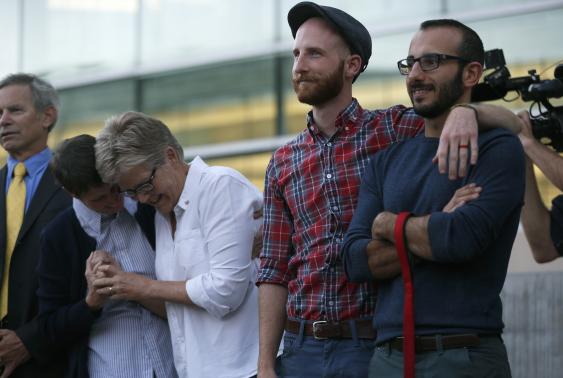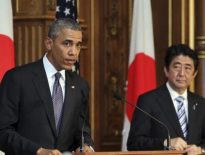(Reuters) – Legal momentum for extending U.S. marriage rights to same-sex couples accelerated on Tuesday as a federal appeals court struck down bans on gay matrimony in Idaho and Nevada a day after the U.S. Supreme Court let stand similar rulings for five other states.

A three-judge panel of the 9th U.S. Circuit Court of Appeals in San Francisco ruled the bans in Idaho and Nevada violated the constitution and cannot be enforced, adding to a growing list of states where same-sex unions are now legal.
The 9th Circuit move puts the United States on track for legal gay marriage in 35 states, as rulings by the court are binding on all states in its region including three others that do not permit gay marriage, Arizona, Montana and Alaska.
We’re on cloud nine! We’re on the roof! said lead Nevada plaintiff Mary Baranovich of Carson City, adding that she was now planning long-overdue nuptials with her partner of 43 years, Beverly Sevcik, with whom she has raised three children.
In Idaho, Ty Carson and her lesbian partner of 16 years, Becky McGavin, were among the gay couples who planned to rush to the county courthouse in Boise to receive licenses.
This is beyond my wildest dreams. I’m trying to get hold of Becky so we can get married as soon as possible, Carson said.
Nevada’s Republican governor, Brian Sandoval, whose state withdrew its opposition to gay marriage earlier this year, said he respected the ruling, and U.S. Senate Majority Leader Harry Reid of Nevada welcomed it warmly.
No longer will gay and lesbian Nevadans be told that their committed relationships are less than those of straight couples, Reid said.
By contrast, Idaho Republican Governor C.L. Butch Otter called the decision disappointing, and Idaho Attorney General Lawrence Wasden said, It’s still too early to know fully what the decision and orders mean for Idaho and how the state will proceed.
County clerks’ offices in big cities in Idaho and Nevada said they were reviewing the ruling and waiting for formal direction before issuing licenses.
Diana Alba, clerk of Nevada’s Clark County, said her office had been preparing for weeks, including changing the forms for marriage licenses so they use gender-neutral pronouns, employing party one and party two instead of bride and groom.
When we get the green light, we’re ready, Alba said.
IMMEDIATE RESPONSE
Gay marriage advocates say the U.S. Supreme Court sent a clear message on Monday by letting stand court rulings allowing gay marriage for five states. The response in those states has been immediate.
The 7th U.S. Circuit Court of Appeals in Chicago issued orders on Tuesday that put into effect an earlier ruling that struck down bans in Wisconsin and Indiana. Gay marriages have already gone ahead in Virginia, Utah and Oklahoma.
In Colorado, which lies in the same judicial appeals circuit as Utah, the Republican attorney general told county clerks to begin issuing marriage licenses to gay couples after that state’s Supreme Court lifted stays in two related cases.
It feels good to be recognized for things that everyone else takes for granted, said Carolanne Fisher, who received a license with her partner Catherine Greenwald at the county clerk’s office in Boulder, Colorado.
Marriage equality advocates in Florida asked a federal judge to lift a stay on a ruling that struck down that state’s gay marriage ban, while three gay couples in South Carolina say they plan to apply for licenses on Wednesday and will sue the state if they are denied.
On Tuesday, four same-sex couples filed a lawsuit against Wyoming and its ban. Wyoming, like Colorado, falls under the jurisdiction of the 10th Circuit and its ruling in June that Utah’s gay marriage prohibition was unconstitutional.
Meanwhile, the Cincinnati-based 6th U.S. Circuit Court of Appeals is due to rule at any time in cases involving four more states that still ban gay marriage.
Appeals in similar cases that saw district court judges strike down bans in Texas and Louisiana are pending before the New Orleans-based 5th U.S. Circuit Court of Appeals. On Tuesday, the court agreed to expedite oral arguments in the Texas case.
It just became a lot harder for any court to uphold a marriage ban, said Camilla Taylor, a lawyer for the gay rights group Lambda Legal.
But South Carolina officials also stood their ground. Until the courts rule on the matter, (we) will seek to uphold our state constitution, Attorney General Alan Wilson said on Tuesday.
(Additional reporting by Lawrence Hurley in Washington, Harriet McLeod in South Carolina, Keith Coffman in Boulder, Zachary Fagenson in Miami, Laura Zuckerman in Salmon, Idaho, Alexia Shurmur in Las Vegas, and Sandra Chereb in Carson City,; Writing by David Adams and Daniel Wallis; Editing by Jim Loney, Sandra Maler and Ken Wills)





